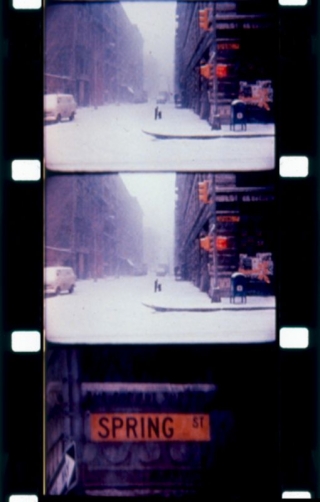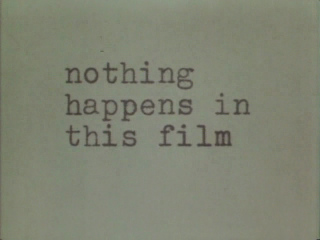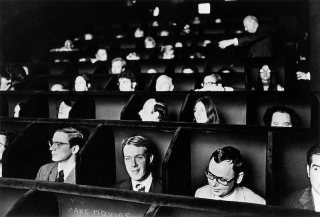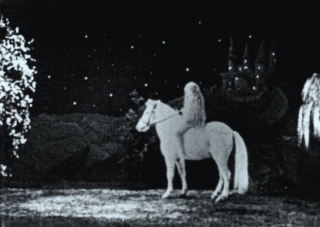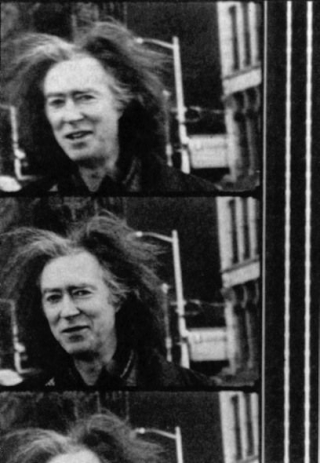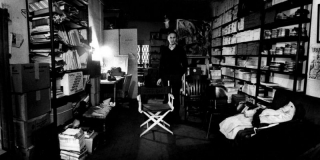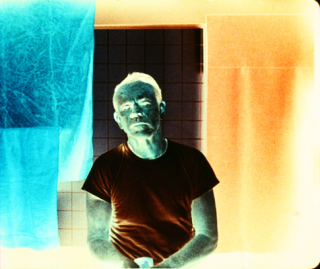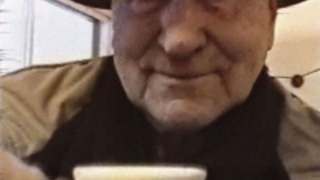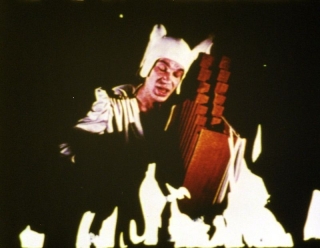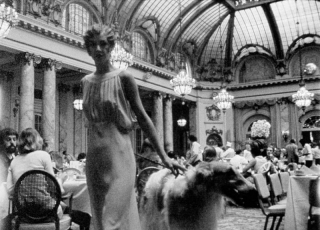Date: 5 January 2013 | Season: Jonas Mekas
PARADISE NOT YET LOST (aka OONA’S THIRD YEAR)
Saturday 5 January 2013, at 6:40pm
London BFI Southbank NFT2
The footage for Paradise Not Yet Lost was shot in 1977 and depicts the third year in the life of the filmmaker’s daughter. As Oona discovers the world at home in New York, and on visits abroad to Sweden, Lithuania, Poland, Austria and Italy, Mekas’ film captures memories for her future: ‘To provide her with a romantic’s guide to the essential values of life – in a world of artificiality, commercialism, and bodily and spiritual poison.’
Jonas Mekas, Paradise Not Yet Lost (aka Oona’s Third Year), USA, 1979, 97 min
with Hollis Melton, Oona Mekas, Peter Kubelka, Harry Smith
Also screening Tuesday 15 January at 8:40pm.
Date: 8 January 2013 | Season: Jonas Mekas
AS I WAS MOVING AHEAD OCCASIONALLY I SAW BRIEF GLIMPSES OF BEAUTY
Tuesday 8 January 2013, at 5:45pm
London BFI Southbank NFT2
Life goes on, and the longest of Mekas’ diary films focuses primarily on family life, chronicling his marriage and two children in material shot between 1970-99. In this more reflective work, his filmmaking moves closer to poetry, observing the beauty and wonder of the everyday. The accumulation is ecstatic, and these fleeting moments convey the subtle joys, emotions and memories of personal and universal experience.
Jonas Mekas, As I Was Moving Ahead Occasionally I Saw Brief Glimpses of Beauty, USA, 2000, 288 min
Music Auguste Varkalis. With Hollis Melton, Oona Mekas, Hollis Frampton, Peter Kubelka.
Also screening Sunday 13 January at 5:30pm.
Date: 9 January 2013 | Season: Anthology Film Archives, Jonas Mekas
ANTHOLOGY FILM ARCHIVES AND ESSENTIAL CINEMA
9—28 January 2013
London BFI Southbank NFT2
Anthology Film Archives was established in 1969 as the first museum devoted to film as an art form. The organisation had its roots in other initiatives also founded by Jonas Mekas, including the Film-Makers’ Cooperative and Showcase, and the New American Cinema Group, whose rousing manifesto began: ‘The official cinema all over the world is running out of breath. It is morally corrupt, aesthetically obsolete, thematically superficial, temperamentally boring.’
At the heart of Anthology’s mission was the creation of a repertory that would define the art of cinema. The uncompromising ‘Essential Cinema’ collection was chosen by a committee that included Stan Brakhage, James Broughton, Ken Kelman, Peter Kubelka, Jonas Mekas and P. Adams Sitney. It incorporates features by Chaplin, Eisenstein and Renoir alongside avant-garde classics by Deren, Frampton and Warhol.
Like any canon, it had its detractors, but the frequent criticism that it only contained works made up to the early 1970s could not be helped – following the death of primary sponsor Jerome Hill, Anthology was unable to maintain its acquisition programme. Despite this, the Essential Cinema remains an extraordinary gathering of the some of the greatest works of cinema history, and nowadays only represents a small portion of the Archive’s rare and unique holdings.
At Anthology’s first home, in a wing of the New York Public Theatre, an extraordinary projection space was built to exhibit the film collection. Designed by Peter Kubelka and known as the ‘Invisible Cinema’, its unique seating arrangement restricted the audience’s vision to the screen, which was in turn the only source of illumination in the room. In 1974, Anthology relocated to a Fluxus Cooperative building designed by George Maciunas, but its long-term base since the 1980s has been the Second Avenue Courthouse where it maintains daily programmes in two cinemas, a gallery, and its unparalleled reference library.
To complement the Jonas Mekas season, these four screenings present works by his contemporaries with a special emphasis on titles in the Essential Cinema collection. The selection also foregrounds the important restoration projects by Anthology and other archives, which preserve films for future generations and enable us to view the very best available prints.
Date: 9 January 2013 | Season: Anthology Film Archives, Jonas Mekas
ANTHOLOGY FILM ARCHIVES AND ESSENTIAL CINEMA PROGRAMME 1
Wednesday 9 January 2013, at 6:10pm
London BFI Southbank NFT2
Maya Deren was at the forefront of a movement that revolutionised cinema by using portable 16mm equipment to reinvent film as an artistic medium that could be the vision of an individual working alone. The filmmakers associated with the New American Cinema invented radical new approaches to photography, soundtracks and editing to create works that remain vital a half-century later.
Maya Deren, Meshes of the Afternoon, 1943, 14 min
Peter Kubelka, Schwechater, 1958, 1 min
Bruce Conner, Cosmic Ray, 1961, 4 min
Marie Menken, Hurry! Hurry!, 1957, 3 min
Gregory Markopoulos, Ming Green, 1966, 7 min
Stan Brakhage, Reflections on Black, 1965, 12 min
Joseph Cornell (with Larry Jordan), The Midnight Party, c.1938/1969, 4 min
Ken Jacobs, Blonde Cobra, 1963, 33 min
Bruce Baillie, Castro Street, 1966, 10 min
Date: 11 January 2013 | Season: Jonas Mekas
BIRTH OF A NATION
Friday 11 January 2013, at 6:20pm
London BFI Southbank NFT2
Some 160 brief portraits of filmmakers and activists, ranging from Chaplin and Langlois to Anger and Gidal. Many were filmed in London during Mekas’ visit to the NFT’s 1973 Avant-Garde Festival. ‘Why Birth of a Nation? Because the independent cinema is a nation in itself. We are surrounded by the commercial cinema nation same way as the indigenous people of the United States or of any other country are surrounded by ruling powers. We are the invisible, but essential nation of cinema.’
Jonas Mekas, Birth of a Nation, USA, 1997, 80 min
Music Hermann Nitsch, Richard Wagner. Voice Jean Houston. With Jack Smith, Jacques Tati, Chantal Akerman, Roberto Rossellini.
Also screening Thursday 17 January at 8:40pm.
Date: 12 January 2013 | Season: Jonas Mekas
JONAS MEKAS STUDY DAY
Saturday 12 January 2013, 1-5pm
London BFI Southbank
Mekas has been a truly phenomenal force through the history of avant-garde cinema since the 1960s—as director, writer, curator and advocate—and an examination of his long and varied career is hugely rewarding and enlightening. To accompany our season celebrating his work, we host an afternoon of special screenings, talks and discussions from noted experts, including a presentation from season curator Mark Webber.
Contributors include :-
Mark Webber, season curator, gives a biographical introduction to Jonas’ activity in New York from his arrival in 1949, through to the beginnings of Anthology Film Archives.
Gideon Bachmann, writer, photographer and filmmaker presents his film, Underground New York (1967, 51mins), a fascinating document that gives incredible insight into the NY Underground scene Jonas is most immediately (and rightfully) associated with, featuring not only Jonas but also Shirley Clarke, Allen Ginsberg, Susan Sontag, Bruce Connor and George Kuchar.
Dr Daniel Kane (University of Sussex), examines the fertile correspondence between parallel avant-garde poetry and film movements in 1960s, drawing on his book “We Saw the Light: Conversations Between the New American Cinema and Poetry”.
Rebecca Lewin, Assistant Curator at The Serpentine Gallery, draws on experience putting together the Serpentine’s exhibition to examine the resonances between the voice of ‘exile’ in Jonas’ films and the state of film ‘in exile’ in the exhibition space.
Stuart Heaney (BFI), thinking through the cultural and biographical circumstances that propelled Mekas towards a diary cinema following his recent experience documenting a series of workshops attached to our season, on 16mm film – using a Bolex camera, Mekas’ own companion for nearly 40 years.
William Fowler, curator of Artists’ Moving Image at the BFI National Archive, examines issues around national identity in the counter-culture of the 1960s, American influence in London and what happened when Jonas Mekas first visited the UK in 1970.
Date: 15 January 2013 | Season: Anthology Film Archives, Jonas Mekas
ANTHOLOGY FILM ARCHIVES AND ESSENTIAL CINEMA PROGRAMME 2
Tuesday 15 January 2013, at 6:20pm
London BFI Southbank NFT2
Jerome Hill was the artist and philanthropist whose support made Anthology a reality. Heir to a railroad fortune, he was also an accomplished filmmaker, winning an Oscar for his documentary Albert Schweizer. Film Portrait is a remarkable autobiography that incorporates home movies, staged scenes, animation and experimental techniques. Screening with a short introduction to Anthology made for French television by Pip Chodorov.
Pip Chodorov, Anthology Film Archives, 2002, 7 min
Jerome Hill, Film Portrait, 1972, 81 min
Date: 17 January 2013 | Season: Jonas Mekas
LETTER FROM GREENPOINT
Thursday 17 January 2013, at 6:20pm
London BFI Southbank NFT2
Having witnessed SoHo’s transformation from vibrant artists community to fashionable shopping destination, Mekas moved out of Manhattan in 2003, leaving the loft at 491 Broadway where he had lived for 30 years. In Letter from Greenpoint, his life is packed away and transported to Brooklyn, where he begins a new life of adventures amid the streets and bars of New York’s latest cultural centre.
Jonas Mekas, Letter from Greenpoint, USA, 2004, 80 min
with Jonas Mekas, Benn Northover, Sebastian Mekas, Phong Bui
Jonas Mekas, Cinema is Not 100 Years Old, USA, 1996, 4 min
A manifesto for the eternal youth of cinema.
Also screening Tuesday 22 January at 8:40pm.
Date: 22 January 2013 | Season: Anthology Film Archives, Jonas Mekas
ANTHOLOGY FILM ARCHIVES AND ESSENTIAL CINEMA PROGRAMME 3
Tuesday 22 January 2013, at 6:20pm
London BFI Southbank NFT2
Rather than using film as a way to tell stories, artists frequently explore the fundamental qualities of the medium and its potential for structuring events in time. Paul Sharits and Tony Conrad exploit the flicker effect in their psychedelic films. 69 is a kinetic display of single-frame animation, whilst Contrathemis recalls the absolute cinema of 1920s. Owen Land uses humour to undermine the rigor of later structural filmmakers.
Dwinell Grant, Composition 2: Contrathemis, 1941, 5 min
Robert Breer, 69, 1968, 4 min
Beverly & Tony Conrad, Straight and Narrow, 1970, 10 min
Paul Sharits, Apparent Motion, 1975, 30 min
Owen Land (formerly known as George Landow), Wide Angle Saxon, 1975, 22 min
Date: 23 January 2013 | Season: Anthology Film Archives
ESSENTIAL EXPERIMENTS: WARREN SONBERT
Wednesday 23 January 2013, at 8:40pm
London BFI Southbank NFT2
To coincide with BFI’s Jonas Mekas and Anthology Film Archives seasons, these two works by Warren Sonbert demonstrate an entirely different approach to lyrical cinema. Having emerged in New York’s bohemian scene, with connections to the Warhol Factory and the coterie of filmmakers around Gregory Markopoulos, Sonbert travelled extensively to film Carriage Trade, his epic montage of people and places. In the more exuberant Friendly Witness, lush imagery is animated by sixties pop and opera.
Warren Sonbert, Carriage Trade, 1972, 61 min
Warren Sonbert, Friendly Witness, 1989, 22 min
Programmed and introduced by independent curator Mark Webber.
